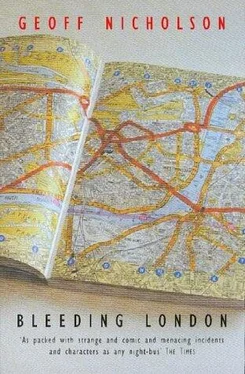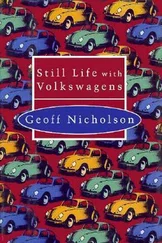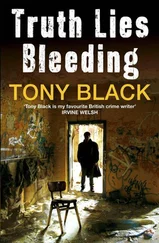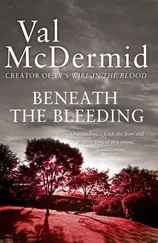He organized a walking tour called Stuart London’s London — The City That Nobody Knows. Of course, he saw there was an absurd contradiction in the tide of the tour. If it was a London that literally nobody knew then clearly he wouldn’t have known it either. But the real problem was nothing so philosophical as that. Quite simply, nobody ever signed up for the tour. Weeks passed and the other tours did good business. People wanted to see the Beatles’ London, and Virginia Woolf’s London, Pepys’ London and Hogarth’s London, but nobody wanted to know the London they didn’t know. They wanted to know better the London they already knew. Stuart was profoundly depressed.
It was Anita who eventually told him he should stop pounding the streets and take a more consultative role, maybe have a less hands-on approach. What she meant, simply, was that he should stop conducting these obscure tours that nobody wanted or enjoyed. He was quietly devastated but he agreed to take a four-week break and see how things went. Ostensibly he would use the time to brush up on his already encyclopaedic knowledge, but in reality he sat around the office watching how efficiently the business worked without any help from him. Young, fresh-faced guides who didn’t know too much actually gave the punters far more of what they wanted than he did. It was a terrible revelation but one he couldn’t ignore.
He agreed to stop leading tours. He stayed in the office and desperately tried to think of a role for himself. He sometimes interviewed potential members of staff but his instinct for spotting potential was fallible. He sometimes trained new guides, but he knew so much about his subject that often he found it impossible to distill information of the right sort and in the right quantities to be useful to new recruits.
For a while he conceived of his consultative role as thinking up new and original ideas for tours, but this was not an area where novelty or ingenuity were particularly welcomed. The Henry VIII Walk and the Jack the Ripper Walk were always likely to do better business than Stuart’s fancier inventions such as the Thomas Middleton Walk, the Post-Modernist Walk, the Anarchists’ Walk. In fact it was a guide in her first week with the company who came up with the idea of the London Lesbian Walk, which for a while was one of the most popular tours.
So Stuart began to withdraw even further. He was no longer sure what his job was, but whatever it was, a lot of people seemed to be able to do it better than he could. He had lost something, a spark, an enthusiasm; a common touch. He felt becalmed. He started to work from home, a situation that rapidly turned into sitting around the house not working at all. He knew that madness lay that way. He was not suited to inactivity. If he wasn’t needed by The London Walker then he wasn’t the sort of person who could simply put in an appearance and pretend he was working when he wasn’t.
There were some ways of disguising his uselessness. There were people ‘he could have meetings with in the name of business, working lunches that could become boozy and prolonged, extended to absorb half the day. But Stuart always felt ashamed to be returning home or to the office half-cut at four o’clock, and by five a fierce alcoholic melancholy would have set in. It felt terrible. There was no way he would be able to pursue a career as a professional London drinker.
More harmlessly he sometimes slipped away to see a movie. That felt only mildly shameful, but the pleasure it brought was outweighed by the guilt he felt, knowing that his wife and his employees were out there working while he wasn’t.
He toyed, very briefly, with the idea of becoming a womanizer, of spending his afternoons having affairs, and he succeeded in going to bed with one of the young female guides. But no, it was more than just going to bed. It had very nearly been a full-blown affair. It had been nice enough in its way, intense and exciting and all that, but it really wasn’t nice enough to risk your marriage and therefore your business and livelihood for, and it certainly wasn’t nice enough to want to make a habit of. Once it was over he hadn’t had the energy or the inclination ever to do it again, but the memory of it stayed with him, both sweet and threatening.
The only kind of clean, simple, honest pleasure that satisfied him was using London in the name of research. Any increase in his knowledge of London must surely be of benefit to the business, or so he told himself. He would spend afternoons in the Museum of London, the V and A, the British Museum. There was nothing academic or systematic about these visits. In fact he would sometimes see other people apparently doing much the same as him, and for them it was obviously nothing more than killing time, sheltering from the cold or rain. But time needed no killing for Stuart. While ever he was engaged with London it passed very swiftly and happily.
On other occasions Stuart needed nothing so organized as a museum. He got pleasure simply from walking the streets of London. Certainly some streets offered more than others. Some were full of interesting sights or people, others were places he knew well or liked a lot. Sometimes he experienced the pleasures of familiarity, sometimes those of novelty, but it was always a pleasure.
He didn’t give much thought to what precisely he was doing, but if he’d been compelled to think it through he would undoubtedly have said this phase was a temporary one, a period of transition before he worked out his new role within the firm. But gradually, and it hardly took a genius to work it out, he saw that no such role would ever materialize. He was, in the most ordinary sense, redundant. The London Walker was no longer going to be part of his life, of his self-definition. He would have to find some different reason for being. He thought of trying to get a new job, of starting a fresh career, but he felt far too jaded and old for that. He needed something that connected with his own deep interests, something that was simply more him. He needed a Big Idea, and sure enough, eventually, it came.
Once it had arrived there was an inevitability about it, something undeniable. He was sitting in the coffee bar of the Museum of Transport in Covent Garden thinking how much he disliked buses and tubes when the idea finally struck, and the moment it was there he couldn’t see why it had been so long coming. It felt so completely and perfectly right. What he had to do was utterly clear. He was going to walk down every street in London.
♦
The reasons why a man might choose to walk down every street in London seemed many and obvious to Stuart. It could for example be explained simply in terms of curiosity, in a man’s urge to see new things, to investigate those parts of the city that were off all the tourist maps, that were known only to locals and the more intrepid explorers.
He would, inevitably, go to places he’d never been before, that was at least partly the point, but he would also find himself in places he didn’t especially want to go. He didn’t think there were any areas in London where it was simply too risky to walk, but he knew he would be going to districts that he had until now consciously avoided — and probably for good reasons — but that was the nature of the beast. Perhaps then his walking would be an act of reclamation, a way of taming the city, a way of saying that London was open and accessible to everyone, that it held no secrets, no unknowable horrors.
Obsession also fitted the case. A man who walked down every street in London could be considered a superior, more abstract sort of trainspotter, with the obsessive’s desire for completion, for having the whole set. He would walk past every school, every gaol, every theatre, every hospital, every pub, every solicitor’s office, every used-car lot, every folly, every MI5 safe house, every brothel and crack den, every plumbers’ merchant, every delicatessen, every law court, every sports stadium, every everything. He would have been there, seen there, done that. And even if he missed certain things, markets that were only held one day a week, parades that were only held one day a year, great buildings that were hidden behind scaffolding, nightclubs that were known only to members, well, at least, he’d have walked past them, been in the streets where they took place.
Читать дальше












